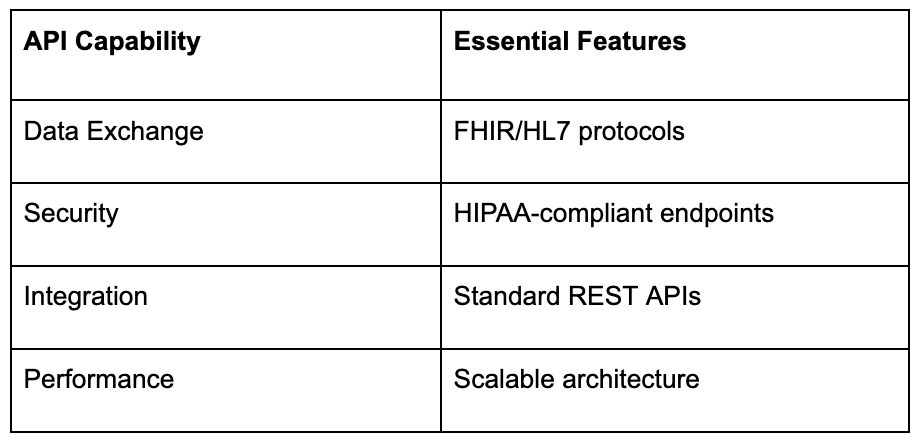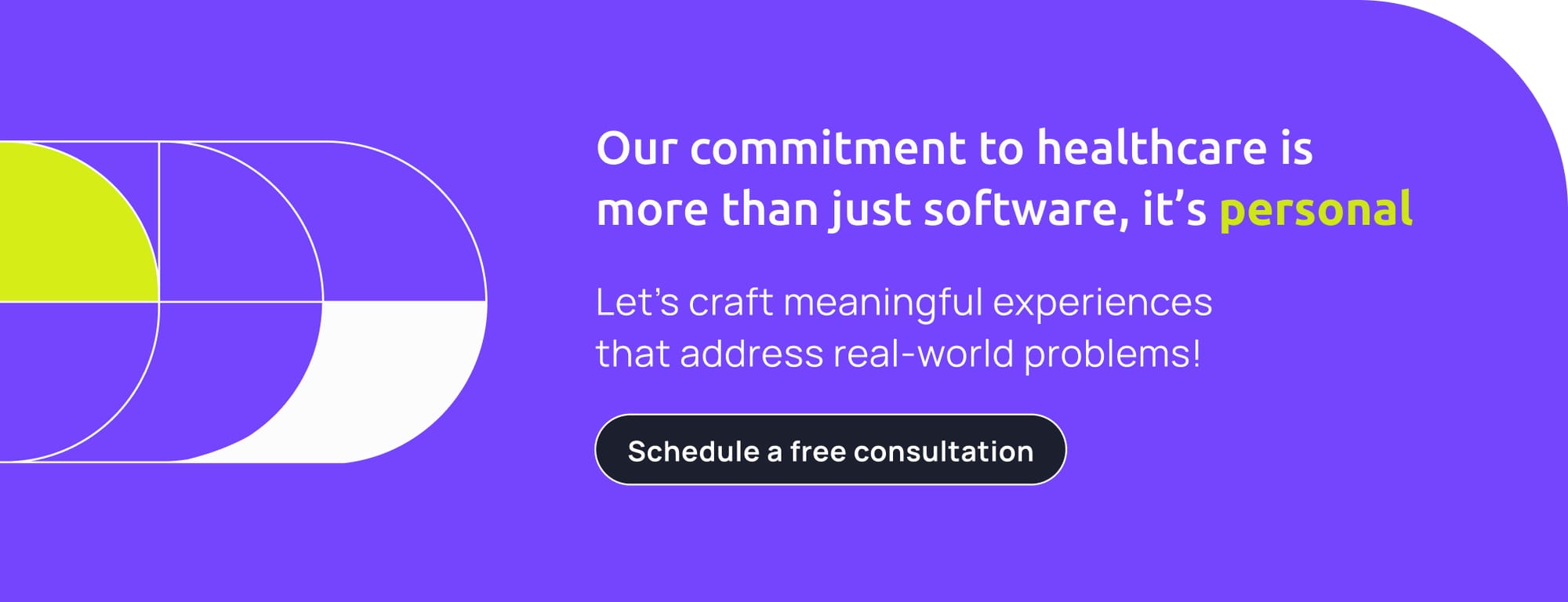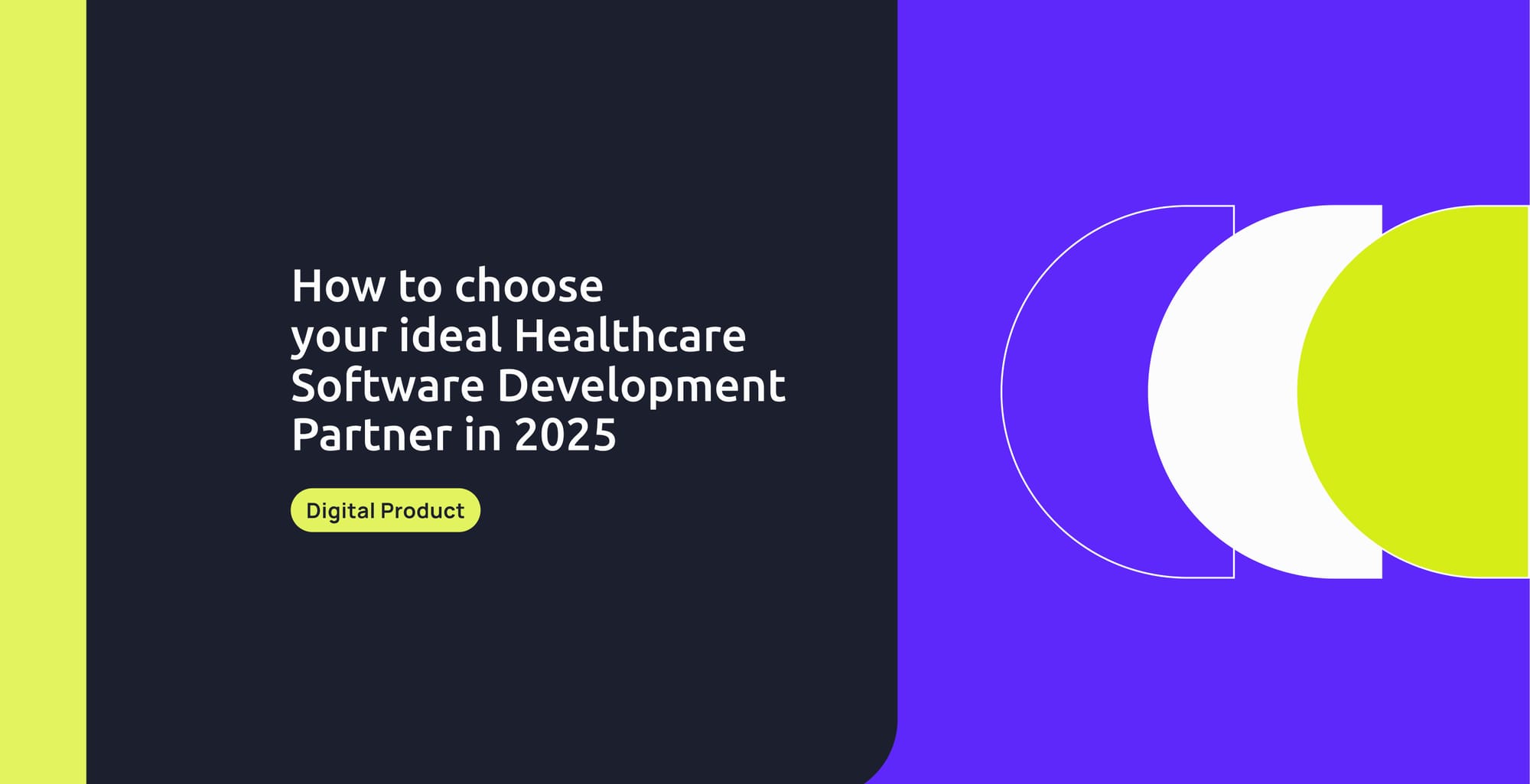Choosing a software development partner is not an easy task. It's not just about technical expertise; the main challenge lies in finding a partner who truly understands the unique demands of healthcare technology. Whether you're a startup looking to revolutionize healthtech or an established business aiming to enhance your digital transformation, selecting the perfect fit is crucial for your project's success. With countless providers promising the moon, knowing what to look for can make all the difference.
What to ask a healthcare software development partner
To make this decision easier, we structured considerations as questions. In this way, evaluating pros and cons is easier. Before we dive deep, let us say that, even if they are your partner already, it is always nice to ask or to keep these considerations in mind to make sure both parties are aligned.
Without further ado, let us guide you through the essential questions you should ask any healthcare software development company, to make sure you are the perfect match.
1 - What is your experience in healthcare software development?
2 - Where is the team based? Will time zone differences be an issue?
3 - What is your approach towards software development?
4 - How do you ensure HIPAA compliance and data Security
5 - How do you approach Healthcare System Integrations?
6 - What is your quality assurance process?
7 - What post-launch support do you provide?
Lets dive in and answer all of these questions.

1 - What is Your Experience in Healthcare Software Development?
When analyzing your partner's experience in healthcare, you need to take into consideration their technical expertise but also their track record in the industry. Some aspects to pay attention to are:
- Healthcare Project Portfolio Analysis: Who you choose should have a well-versed portfolio so you can evaluate their work in the industry. Of course ensuring they know what they are doing is important, but also checking and asking for references does not hurt. Who they partnered with and how they provided the service speaks volumes. You should not only see what they have to say; reviews are a great tool to help and guide you.
- Medical Software Development Track Record: What should your partner have experience with to ensure your product’s success? Beyond a particular technology, you should pay close attention to their knowledge and experience regarding:
- HIPAA-Compliant App Development: Ensuring top-notch security and compliance.
- Seamless Integration and Interoperability: Skillful connection with healthcare APIs and third-party tools.
- EHR Expertise: Experience navigating different Electronic Health Record systems with finesse. Want to know more about this? Check this post
- Mobile Healthcare Apps: Crafting user-friendly solutions for health on-the-go.
- Industry Trends: Staying on top of the latest digital health breakthroughs and future possibilities.
2 - Where is the team based? Will time zone differences be an issue?
Choosing a software development partner goes beyond evaluating numbers and technical skills; it's about building a relationship. Effective communication is crucial for ensuring both parties are on the same page, creating an environment that enables project success. The benefits of sharing time zones with your provider are:
- Improved Communication: It’s easier to schedule meetings and calls without worrying about time differences.
- Faster Response Times: Quicker turnaround for emails and messages, leading to more efficient problem-solving. This is crucial if unexpected issues arise.
- Enhanced Collaboration: Real-time collaboration on projects and tasks, boosting productivity.
- Better Relationship Building: More opportunities for timely interactions, fostering stronger client relationships.
- Reduced Stress: Eliminates the need to work odd hours, promoting a healthier work-life balance.
Your partner's location may be just as important as the investment you are willing to make. If your product requires real-time communication and strong synergy for its building, it should be as close as possible. In this sense, Nearshore partners often strike the perfect balance.
3 - What is your approach towards software development?
Evaluating your potential partner’s development approach is key for making sure that your project is delivered on time, stays within scope, and achieves the highest quality standards.Start by exploring whether their methodology aligns with an iterative, user-centered approach—one that emphasizes continuous improvement, rapid prototyping, and validated learning. Ask whether they rely on Agile, Waterfall, or a hybrid approach, and determine how flexible their process is by discussing frequency of iterations and the mechanisms they use to incorporate client feedback throughout the development cycle.
In addition to methodology, understanding project planning and roadmapping strategies is also important. A partner who clearly defines milestones, efficiently manages scope changes, and organizes development cycles, demonstrates an ability to adapt to evolving project needs. This approach not only minimizes waste but also helps pivot quickly when new insights or market changes occur. Just as important is their commitment to user-centered design—research how they leverage wireframing, usability testing, and iterative design improvements to make sure the final product truly meets end-user requirements.
Furthermore, effective collaboration and communication are vital; ask about the tools they use to maintain transparency and keep stakeholders informed, such as shared project management dashboards and regular progress updates.
By addressing these points, you can assess whether the partner’s approach aligns with your strategic goals and the demands of healthcare technology development.
4 - How Do You Ensure HIPAA Compliance and Data Security?
Security is the foundation of healthcare software development, especially with a rise in data breaches that can cost organizations tons of money.
Their security protocols must adhere to HIPAA's administrative, physical, and technical safeguards, guaranteeing strong protection for sensitive patient data. If you want to know more about this, check one of our posts: “5 Must-Know Tips for Launching a HIPAA-Compliant App”
A reliable software development partner must be ready to present proof of regular security assessments and updates to their protective measures. In case of a security incident, they should diligently document its cause, procedure and resolution.
5 - How do you approach Healthcare System Integrations?
- System integrations are key when selecting a healthcare software development company. In today's healthcare landscape, where EHR integration is essential, your partner's approach to integration can make or break your project's success.
- Healthcare API ExperienceImplementing healthcare APIs requires specialized knowledge of standards like HL7 (Health Level-7) FHIR (Fast Healthcare Interoperability Resources). When evaluating potential partners, consider their experience with:

Your software development partner should demonstrate expertise in implementing APIs that support healthcare data standards, ensuring secure and compliant data exchange across different healthcare systems.
- Interoperability StandardsMedical device interoperability is about the safe and effective exchange of information among various devices and systems. A qualified healthcare software development partner should be well-versed in these recognized standards:

The right partner understands that interoperability improves patient care and reduces errors through standardized protocols. Their approach to integration should prioritize both technical excellence and practical healthcare outcomes.
6 - What is Your Quality Assurance Process?
Unlike other industries, where digital solutions are tested to ensure smooth user interaction, healthcare requires an even more critical approach to Quality Assurance. In healthcare, where applications may be used for vital functions such as diagnosis, treatment, and patient monitoring, the QA process becomes absolutely essential. Thorough testing in this context is crucial to avoid errors that could directly impact patient safety.
There are different approaches to the QA process. At Light-it, we don't treat QA as just a phase at the end of the project, but integrate it throughout the entire development lifecycle, from ideation to production deployment and maintenance. In other words, while end-stage testing is crucial, QA at Light-it is also involved from the very beginning of the project, helping identify gaps in requirements, offering improvement suggestions, and detecting issues early, before they are implemented.
Here are some key considerations:

Prioritizing these factors ensures your healthcare application is reliable and safe for patient and provider use. Always ask your future and current partner how they perform testing so you can sleep at night knowing your product and your clients are well cared for.
7 - What Post-Launch Support Do You Provide?
Post-launch support may be essential for your product. It's important to carefully evaluate your project’s needs and your software development partner's ongoing support capabilities, as healthcare applications require continuous attention to ensure optimal performance and security. Choosing a partner who provides robust post-launch support can make all the difference.
Final thoughts:
Selecting the right partner can significantly impact patient care quality, operational efficiency, and regulatory compliance. We've created a framework to help you make well-informed decisions but, ultimately, the success of your healthcare software project depends on choosing a partner who aligns with your organization's goals, culture, and work ethic while upholding the highest standards of security and compliance.
We hope this post has provided valuable insights to start meaningful conversations. Always remember, Light-it is here to help! Our team has the expertise to make your product or speed your organization’s digital transformation.


